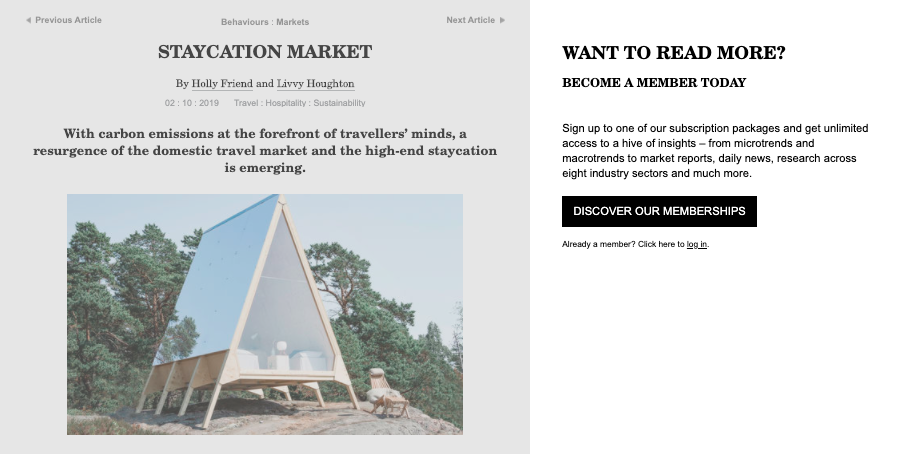Staycation Market
With carbon emissions and now a travel-restricting pandemic at the forefront of travellers’ minds, a resurgence of the domestic travel market and the high-end staycation is emerging.
Just 3% of the world was wealthy enough to fly in 2017, yet a sense of shame is fuelling a backlash against air travel (source: Deutsche Welle).
‘Shame is often thought of as a bad emotion, but it can also be an important emotional bearer of information that encourages us to take responsibility for our actions,’ says Maria Wolrath-Söderberg, a researcher at Södertörn University in Stockholm.
Travel and hospitality brands should be aware of a counter-movement against globetrotting lifestyles, as eco-conscious consumers extend their morals to their travel decisions, eschewing far-flung destinations in favour of guilt-free staycations.
Flying shame
The aviation industry is hugely damaging to the planet. In the UK, it is likely to be the biggest source of emissions by 2050, according to the UK’s Committee on Climate Change, and the International Civil Aviation Organization expects that by 2020 global emissions will be 70% higher than in 2005. Driving this pollution, the number of air passengers around the world continues to increase – airlines carried 4.3bn passengers in 2018, a rise of 6.1% on the 2017 figure, and there were about 38m departures globally.
In order to visualise the impact flying has on our environment in a more engaging way, new tools such as Shame Plane are emerging. The platform lets users input details of where they are flying and shows how the emissions saved by avoiding a flight compare to more commonly adopted behaviour such as eating locally or becoming vegetarian.
In response, more and more consumers are boycotting air travel. In a movement led by 16-year-old climate activist Greta Thunberg, Swedish consumers are championing the concept of flygskam, or flying shame. According to Sifo, almost twice as many Swedes chose to travel by train instead of flying in the past year and a half, rising from 20% to 37%. This is having a knock-on effect on airports – passenger numbers dropped by 8% domestically and by 4% internationally from January to April 2019 compared with the same period in 2018.
18 June 2020
Author: Holly Friend
Image: Get Onboard: Reduce, Reuse, Rethink by PriestmanGoode aims to raise awareness of how much waste is generated through air travel.
Share
𝕏
Superior staycations
With flying shame comes a renewed interest in the staycation, as travellers choose to explore their home country a little more rather than far-flung destinations. Neste, a renewable diesel company, recently introduced the Zero Vacation, a travel experience to reduce consumers’ carbon footprint. The trips take place on the Swedish island of Lidö, where holidaymakers can stay in a cottage built with durable materials that have minimal impact on the environment. Every aspect of the trip, from dining to transport, is designed to produce as few emissions as possible, in line with Sweden’s aim to become fossil fuel-free by 2045.
These staycations are not exclusive to famously eco-conscious Swedes. There is also demand from wealthy US consumers to experience the most remote parts of their home nation. ‘We are seeing a real demand among well-travelled, wealthy US clients that have travelled around the world,’ says Sam Highley, founder of All Roads North. ‘They realise they haven’t really seen America.’ Although upmarket road trips were once an oxymoron owing to a lack of high-end accommodation, a new wave of hotels such as Blackberry Farm and Post Ranch Inn are opening up Middle America for affluent tourists.
For those planning a domestic staycation beyond their city, rail travel is being transformed. This is the concept behind America’s Trains, a luxury holiday train service from Amtrak. In the coming years, it plans to launch 40 rebuilt passenger cars with about 175 bedrooms within five years. The all-inclusive trips will run for up to eight nights, covering gourmet meals, complimentary beverages and stopovers at destinations en route.
‘We are seeing a real demand among well-travelled, wealthy US clients that have travelled around the world. They realise they haven’t really seen America.’
Sam Highley, founder, All Roads NorthWant to read more?
Become a member today!
Sign up to one of our subscribtion packages and get unlimited access to a hive of insights - from microtrends and macro trends to market reports, daily news, research across eight industry sectors and much more.
Discover our memberships
Already a member? Click here to login

